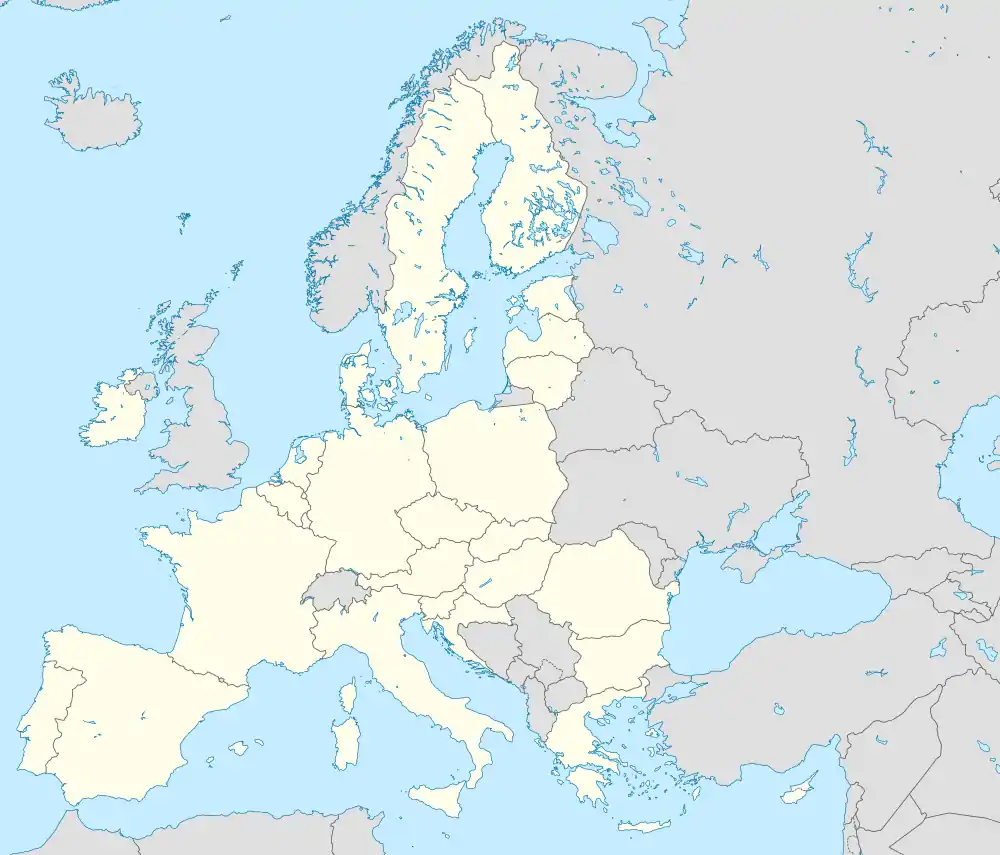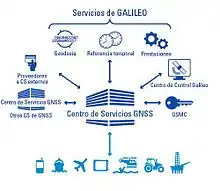European GNSS Agency
The European Global Navigation Satellite Systems Agency (European GNSS Agency; GSA; formerly European GNSS Supervisory Authority) is the agency of the European Union (EU) that aims to ensure that essential public interests are properly defended and represented in connection with satellite navigation programmes of the union: Galileo and European Geostationary Navigation Overlay Service (EGNOS). The aim of the former is to provide a modern European alternative to the established American system, GPS.
 | |
 GSA Headquarters in Prague | |
 Prague European GNSS Agency (European Union) | |
| Formation | 12 July 2004 (ratified) 2004 (established) |
|---|---|
| Location | |
Director | Rodrigo Da Costa |
Legal authority | Council Regulation No 1321/2004 |
| Website | gsa.europa.eu |
Creation and history
Established in 2004 and based in Prague, Czech Republic, since 1 September 2012, the agency is responsible for managing and monitoring the use of the program funds. It will help the European Commission deal with any matters relating to satellite radio-navigation.
As of 2019, it has been decided by the European Commission that the agency would be transformed and expanded into the European Union Agency for the Space Programme (EUSPA) with oversight of space situational awareness and a new Governmental Satellite Communication (GOVSATCOM) initiative.[1][2] This will happen in January 2021.[3]
The European GNSS Service Centre (GSC), Madrid
The European GNSS Service Centre (GSC) is an integral part of the European GNSS infrastructure, which represents the interface between the Galileo system and the users of the Galileo Open Service (OS) and the Galileo Commercial Service (CS).
The European GNSS Agency (GSA) is responsible for the administration of the GSC.
The GSC is located in Madrid, in the facilities of the Spanish National Aerospace Institute (INTA),[4] in Torrejón de Ardoz.[5]
History

The European GNSS Service Center was inaugurated in May 2013 by Vice-President of the European Commission Antonio Tajani, Commissioner for Industry and Entrepreneurship and the Spanish Minister of Development Ana Pastor. The center itself was named as a tribute to the former Vice President of the EC "Loyola de Palacio", the then Commissioner for Transport[6]
On 17 March 2011, a Memorandum of Understanding (MoU) was signed by the Vice President of the EC Antonio Tajani and the Spanish Minister of Transport José Blanco López. This letter of intent outlined the conditions and requirements for hosting the GNSS Service Center (GSC) in Spain and for conducting a Spanish study to prepare the center. The GSC deployment agreement was published in the Official Journal of the European Union on 23 February 2012, which stated that the global network of ground stations as part of the Galileo program included six centers and one station. The GSC is one of these six ground stations (MCC, GSMC, GSC, GRC).
Area of responsibility

The goals of the center are:
- Providing companies and users with general information: The GSC offers basic services for the user community via a web portal and a user help desk.[7] A special website www.gsc-europa.eu is made available to Galileo users to answer questions.
- Distribution of timely service information: information about the system, system status and other messages for users.
- Support for service provision: exchange of R&D and industry knowledge of individual market segments.
- Provision of current information and performance reports regarding the program status
- Application and product developers with access to market experts in key segments.
- Provision of basic services for the user community via a web portal and a user help desk.
- Exchange of R&D and industry knowledge per market segment.
- Information about the program status and ICD documents (Interface Control Document).
- Access to market experts in key segments.
GNSS Service Center (OS and CS) at FOC
The GSC acts as an interface between the Galileo system and the open service users as well as between the commercial service providers and / or users. It also provides users with CS service performance assessment and notifications. The GSC sets up a competence center for OS and CS service aspects, which are accessible to users via the user help desk and the web portal. The information is provided by a communication platform, an electronic library with Galileo and GNSS reference documentation as well as by the ad hoc provision of specific Galileo information. The GSC supports the Open Service and Commercial Service and their applications.
References
- https://www.euractiv.com/section/politics/news/advocate-general-eu-court-has-no-say-on-croatia-slovenia-border-row/
- Questions and Answers on the new EU Space Programme, European Commission Press Release Database.
- https://www.gsa.europa.eu/newsroom/news/gsa-euspa-space-transforming-business-and-economy
- Informationen zum European GNSS Service Centre
- Informationen zum European GNSS Service Centre
- New Global Navigation Satellite System service centre in Spain to help European businesses access data
- The European GNSS Service Centre is open to help users
